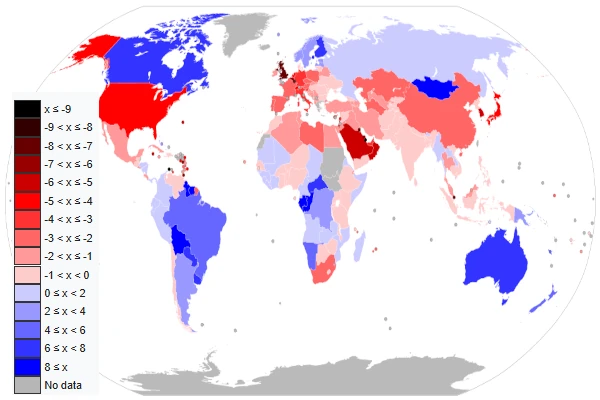
Since the beginning of the industrial era, humanity has been exerting increasing pressure on natural resources. Energy consumption, mining, deforestation, and urbanization contribute to a rapid increase in the ecological footprint. If the world population continues to grow and average consumption per person increases, the demand for resources will far exceed the planet's regenerative capacity.
The table highlights the extent of ecological imbalances at the national level. Countries with high per capita consumption and industrialization, such as the United States, Canada, or Germany, have the largest ecological deficits, with a footprint far exceeding national biocapacity. In contrast, several countries with per capita biocapacity greater than their consumption have an ecological surplus. This is the case for Australia or Venezuela. These surpluses reflect both low population densities and abundant natural resources. This distribution clearly shows that ecological deficit is correlated with per capita consumption and industrial intensity, while ecological surplus mainly depends on the availability of renewable resources and population density.
| Country | Biocapacity (gha/cap) | Ecological Footprint (gha/cap) | Surplus / Deficit (gha/cap) | Comment |
|---|---|---|---|---|
| United States | 3.6 | 8.0 | -4.4 | Significant ecological deficit, consumption far exceeds national resources |
| Canada | 3.8 | 8.0 | -4.2 | High ecological deficit despite large biocapacity, due to very high per capita consumption |
| Germany | 1.6 | 5.0 | -3.4 | Significant ecological deficit, high per capita consumption and necessary imports |
| United Kingdom | 1.5 | 4.8 | -3.3 | High deficit, strong energy and industrial consumption |
| France | 3.1 | 5.0 | -1.9 | Ecological deficit, dependence on imports to meet consumption |
| China | 2.1 | 3.7 | -1.6 | Moderate to high deficit, pressure due to population and industrialization |
| India | 1.2 | 1.8 | -0.6 | Moderate deficit, insufficient resources for consumption |
| Colombia | 2.3 | 2.0 | +0.3 | Small ecological surplus, but positive |
| Russia | 5.5 | 5.0 | +0.5 | Slight surplus, large area and abundant resources offset per capita consumption |
| Chile | 2.5 | 2.0 | +0.5 | Slight surplus, moderate pressure on resources |
| Argentina | 3.8 | 3.0 | +0.8 | Moderate ecological surplus thanks to agricultural land and natural resources |
| Brazil | 4.5 | 2.8 | +1.7 | Ecological surplus, resources exceed consumption |
| Venezuela | 8.0 | 5.5 | +2.5 | High ecological surplus due to high per capita biocapacity |
| Australia | 9.0 | 6.5 | +2.5 | High ecological surplus due to low population density and significant biocapacity |
Source: Global Footprint Network, United Nations, Climate Change Science.
The human ecological footprint continues to grow slightly, exceeding Earth's regenerative capacity. Some positive effects of human corrective actions are beginning to be perceived, but they remain very modest on a global scale. The transition to renewable energies, the reduction of excessive consumption, and the protection of ecosystems are essential to avoid global ecological collapse.
| Year | Average global biocapacity (gha/cap) | Average global ecological footprint (gha/cap) | Deficit / Surplus (gha/cap) | Comment |
|---|---|---|---|---|
| 2000 | 1.8 | 2.3 | -0.5 | Moderate global deficit, consumption slightly higher than biocapacity |
| 2005 | 1.8 | 2.5 | -0.7 | Increasing ecological deficit with global economic growth |
| 2010 | 1.8 | 2.6 | -0.8 | Increased pressure on renewable resources, continuing overshoot trend |
| 2015 | 1.7 | 2.7 | -1.0 | The global deficit is increasing, consumption significantly exceeds biocapacity |
| 2020 | 1.7 | 2.8 | -1.1 | Significant global ecological deficit, need for measures to reduce the footprint |
| 2024 | 1.7 | 2.8 | -1.1 | Similar situation to 2020, human consumption continues to exceed available resources |
Source: Global Footprint Network, 2024